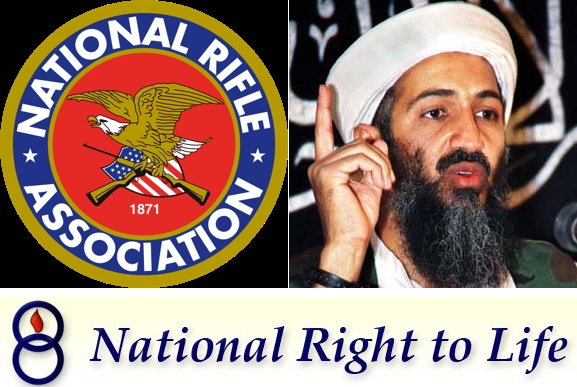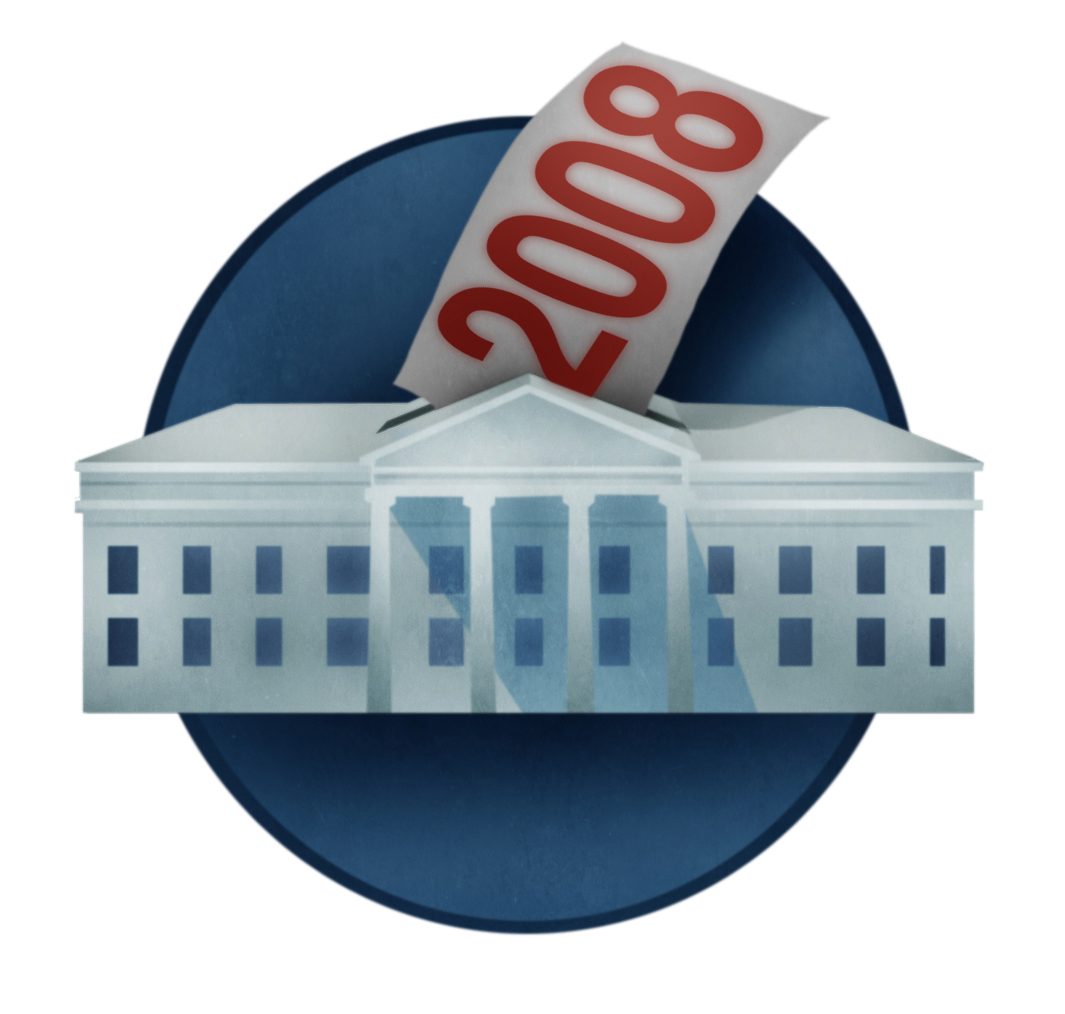Al Qaeda’s Voter Survey
The organization that has most affected American politics over the last eight years is one whose endorsement no candidate would ever seek: the Al Qaeda terrorist movement. This year, Al Qaeda’s candidate appears to be McCain, according to many former intelligence officials and terrorism experts.
Jul 31, 2020177.2K Shares2.3M Views
Three of Sen. John McCain's endorsements, some more desirable than others. (Wikimedia/Flickr: ManilaRyce)
So far, this election cycle has yielded the usual presidential endorsements from the usual special-interest groups. The League of Conservation Voters (Sen. Barack Obama). The National Rifle Assn. (Sen. John McCain). The AFL-CIO (Obama). The National Right to Life Political Action Committee (McCain).
But the organization that has most affected American politics over the last eight years is one whose endorsement no candidate would ever seek: the Al Qaeda terrorist movement. To the degree it seeks to play a role in the 2008 election, Al Qaeda’s candidate appears to be McCain, according to many former intelligence officials and terrorism experts.
Illustration by: Matt Mahurin
Last week, a posting on an Al Qaeda-aligned jihadist message board, al-Hesbah, embracedthe Republican presidential nominee. Al Qaeda’s goals require “the presence of an impetuous American leader such as McCain, who pledged to continue the war till the last American soldier,” according to the anonymous post. “Then, Al Qaeda will have to support McCain in the coming elections so that he continues the failing march of his predecessor, Bush.”
The McCain campaign, in a conference call the next day, understandably distanced themselvesfrom the jihadist forum. After all, Republicans have argued for the past three national elections that electing Democrats would be tantamount to giving Osama bin Laden an invitation to the Lincoln Bedroom.
Perhaps most famously, Sen. Saxby Chambliss (R-Ga.) unseated Max Cleland, a triple-amputee Vietnam veteran and a Democrat, by running an adfeaturing Cleland’s face along with those of bin Laden and Saddam Hussein. Indeed, on the call, Randy Scheunemann, a senior foreign-policy adviser to McCain, linked Obama to the Palestinian terrorist group Hamas. TWI’s Matthew DeLong has reportedseeing signs near McCain rallies that place images of Obama and bin Laden side by side.
But interviews with intelligence officials and other experts on the international jihadist movement back the assessment of al-Hesbah’s anonymous extremist. “Al Qaeda would like McCain to come to power and see an extension of Bush’s policies,” said Rohan Gunaratna, head of Singapore’s International Center for Political Violence and Terrorism Research, one of the world’s most respected anti-terrorism institutes.
“They would prefer a McCain victory,” agreed Paul Pillar, a former lead analyst at the CIA’s counterterrorism center and the intelligence community’s chief Mideast analyst from 2000 to 2005.
Despite the Republican effort to portray Democrats as the useful idiots of terrorists and themselves as stalwart defenders of freedom, Washington’s mishandling of the war in Afghanistan and the occupation of Iraq have energized and magnified Al Qaeda, demonstrating the counterproductive aspects of U.S. bellicosity.
Bin Laden himself has straightforwardly described his strategy as one designed to provoke the far-more-powerful United States into a series of bloody, expensive and futile military expeditions. McCain has mocked Obama’s rejection of the Bush administration’s militarism as a disqualification from office.
“Bin Laden surely would vote for McCain,” said Jonathan Stevenson, a professor of strategic studies at the U.S. Naval War College. “Bush, whose foreign policy McCain pretty much supported, has been a recruiting sergeant for Al Qaeda and its kin.”
Ironically, bin Laden outlined his strategy in a manner designed to bring it about. The weekend before the 2004 presidential election, the leader of Al Qaeda released a videotapeexcoriating Bush and explaining Al Qaeda’s efforts at “bleeding America to the point of bankruptcy.” Author Ron Suskind reported in “The One Percent Doctrine”that the CIA assessed the tape was designed to aid Bush’s reelection by infuriating American voters.
Pillar recalled that while he didn’t see any classified assessments, bin Laden indeed intended to ensure Bush would get another four years in office. “He had a clear preference for Bush,” Pillar said.
The items atop Al Qaeda’s metaphorical voter scorecard are “just the opposite what of what some would think,” said a retired senior CIA operative who requested anonymity. First and foremost, he said, Al Qaeda would prefer Washington to continue its war in Iraq, as McCain has promised and Obama has rejected.
While the Sunni Awakening and the U.S. troop surge have dealt serious damage to Al Qaeda’s affiliate in Iraq, the retired operative said, “the long term view will be more complicated,” as the Shiite-led Iraqi government fails to reconcile with disenfranchised Sunnis. “It would be in their interests for U.S. troops to leave, but it’s also not bad for them if they stay,” the retired operative continued. “It’s the best of both worlds. The more they view us as occupiers, the better it is for them.”
A continued U.S. occupation of Iraq has additional benefits for bin Laden, Stevenson said. “Primarily, it would bog down the U.S. military and make it easier for Al Qaeda to secure physical space in tribal areas of Pakistan, and prevent [the U.S. from] refocusing on Afghanistan, as Obama wants to do,” he said. “Secondly, it would continue to give Al Qaeda a new training ground for aspiring jihadists. … From a political point of view, it plants a large U.S. presence in a very important Arab and Muslim country. It tends to perpetuate and stoke Muslim grievances.”
Additionally, Al Qaeda would like to see the next U.S. administration adopt a “hard line on not engaging with the governments of Muslim countries, including Syria and Iran,” Pillar said. Obama’s pledge to negotiate with the Iranians has fueled a consistent McCain attack for weeks, but not to do so “would aid [Al Qaeda's] message,” as would “continued uncompromising, unflinching support for Israeli positions” in the Israeli-Palestinian conflict, Pillar added.
In Afghanistan and Pakistan, “continued, if not expanded, use of military force in northwest Pakistan” by the U.S. “would be welcomed” by Al Qaeda, Pillar said, highlighting a position that Obama has, under certain conditions, entertained embracing.
But the retired senior CIA operative said “the one thing that would give [Al Qaeda] a problem” in the region would be for the U.S. to negotiate a separate peace deal with the Taliban, thereby depriving Al Qaeda of critical logistical, tactical and moral support. Negotiations with the Taliban were recently embraced, however tentatively, by Obama in a recent interview with Time Magazine’s Joe Klein, and by Gen. David Petraeus, the soon-to-be commander of all U.S. troops in the Middle East and South Asia.
What Al Qaeda would most probably least like to see a new administration do is to reconcile with a suspicious Muslim world. While McCain has pledged to work with moderate Muslims, Obama has vowed to deliver a major address in an Islamic capitol city during his first year in office.
“Use of soft power by Obama will weaken support and sympathy for Al Qaeda and its associated groups and self-radicalized homegrown cells,” Gunaratna wrote in an email from Egypt. “Since Iraq, jihadism is moving from the periphery to the centre of the Muslim world! Although Americans are the most generous people on earth, the U.S. under President Bush has lost tremendous international goodwill. [McCain's] understanding is very similar to Bush.”
Still, the question remains whether, as in 2004, bin Laden will attempt to sway the election by releasing a videotape in the race’s final days. The many experts interviewed for this piece were unwilling to predict that either bin Laden, his deputy Ayman al-Zawahiri or another Al Qaeda communique would do this. “I think the odds are less and less each day,” Pillar said.
But even if Al Qaeda does release a communique in the next seven days, Stevenson was unsure it would have much impact. “I don’t think foreign policy is the primary election issue this year, whereas it certainly was in 2004,” he said. “And we have gone another four years without a major attack in the U.S.
“Even if Al Qaeda sounds threatening and suggests an Obama presidency would make America more vulnerable,” Stevenson continued, “it might have a crying-wolf effect to it. This year, ‘it’s the economy, stupid.’”

Rhyley Carney
Reviewer
Latest Articles
Popular Articles

